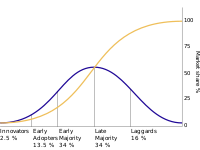
Photo from wikipedia
In this paper, we detect communities from trajectories. Existing algorithms for trajectory clustering usually rely on simplex representation and a single proximity-related metric. Unfortunately, additional information markers (e.g., social interactions… Click to show full abstract
In this paper, we detect communities from trajectories. Existing algorithms for trajectory clustering usually rely on simplex representation and a single proximity-related metric. Unfortunately, additional information markers (e.g., social interactions or semantics in the spatial layout) are ignored, leading to the inability to fully discover the communities in trajectory database. This is especially true for human-generated trajectories, where additional fine-grained markers (e.g., movement velocity at certain locations, or the sequence of semantic spaces visited) are especially useful in capturing latent relationships among community members. To overcome this limitation, we propose TODMIS, a general framework for Trajectory-based cOmmunity Detection by diffusion modeling on Multiple Information Sources. TODMIS combines additional information with raw trajectory data and construct the diffusion process on multiple similarity metrics. It also learns the consistent graph Laplacians by constructing the multi-modal diffusion process and optimizing the heat kernel coupling on each pair of similarity matrices from multiple information sources. Then, dense sub-graph detection is used to discover the set of distinct communities (including community size) on the coupled multi-graph representation. At last, based on the community information, we propose a novel model for online recommendation. We evaluate TODMIS and our online recommendation methods using different real-life datasets. Experimental results demonstrate the effectiveness and efficiency of our methods.
Journal Title: IEEE Transactions on Knowledge and Data Engineering
Year Published: 2017
Link to full text (if available)
Share on Social Media: Sign Up to like & get
recommendations!